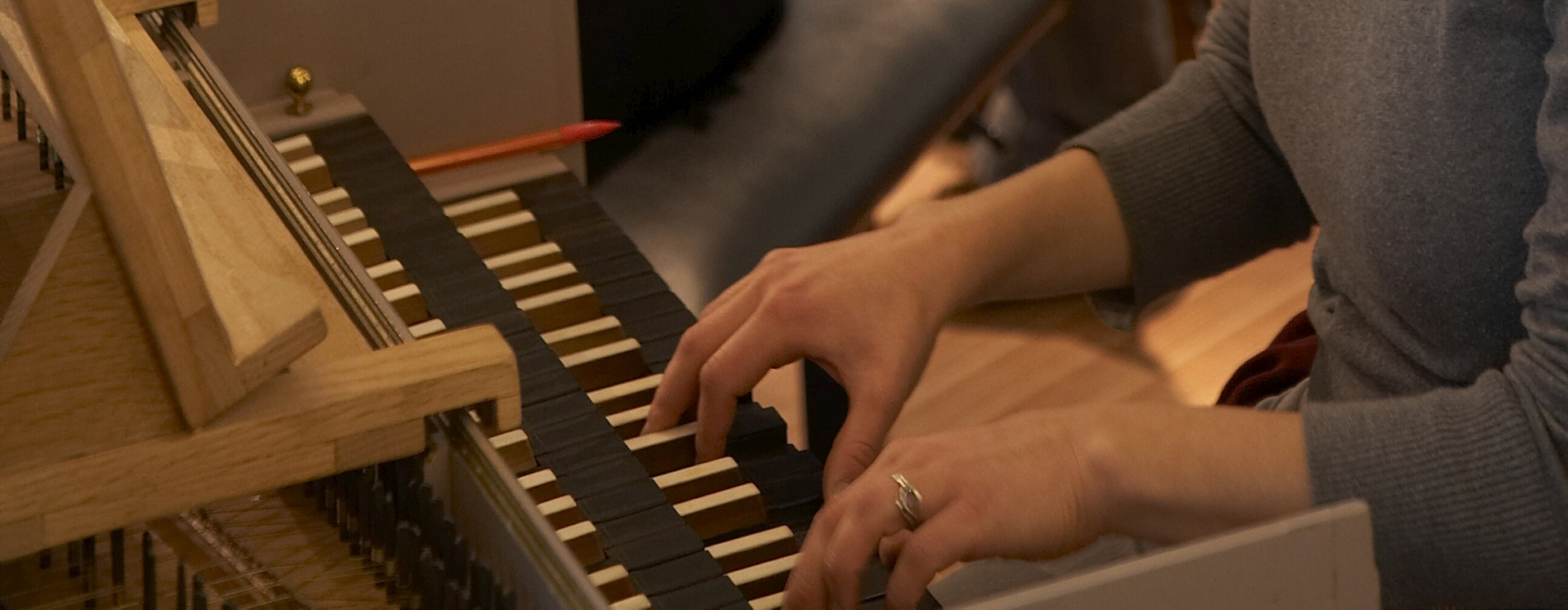Harpsichord
Section representative: Menno van Delft
This is a multifaceted degree programme in which repertoire ranging from the 15th to the 19th and 20th/21st century style periods is taught, incorporating as many aspects of the profession as possible:
- individual private lessons (technique, use of the instrument, technique and performance practice, repertoire from the various periods)
- basso continuo lessons, individual/practical lessons as well as theoretical (group) lessons
- 20th- and 21st-century harpsichord repertoire
- improvisation
- theory of the principal subject (tunings, construction, history, repertoire, notation, performance practice)
- possibility to take organ, pianoforte or clavichord as a subsidiary subject
- regular group lessons
- methodology (teaching)
- chamber music and ensembles taught by various teachers
- orchestral repertoire, orchestra class and participation in orchestra projects
- the Sweelinck Baroque Orchestra class is held once a week under the guidance of various teachers, giving participants a chance to work on harpsichord concertos, in addition to other opportunities.
- regular evening group recitals
- visiting museums and libraries
- participation in masterclasses
- lectures
- attending the rehearsals and concerts of acclaimed orchestras and ensembles
Admission requirements
Music from various style periods, including the following required works:
- an English pavane and galliard
- a seventeenth-century Italian work
- three movements from a suite by a French composer
- J.S. Bach – a prelude and fugue from Das wolhtemperierte Clavier (bachelor’s: Book I; master’s: Book II)
- D. Scarlatti – a fast sonata
- A short sight-reading test (solo and basso continuo) will also be given.
- Should the candidate so wish, he/she may perform a short improvisation and/or a modern work for harpsichord.
After the two-year course, students will be ready to enter the professional music world at the highest level. The student will acquire the in-depth knowledge intended in the master's degree programme by choosing to study a particular area of repertoire which will be examined in a more profound and comprehensive way than is possible during the bachelor's degree programme.
Admission requirements
1. The candidate will perform a programme which may not exceed one half-hour. During the entrance examination, which will last approximately one half-hour, the candidate must demonstrate that he/she possesses above-average, high-minded qualities as a harpsichordist, a good overview of the harpsichord repertoire and a solid mastery of the various main styles.
2. The candidate must submit a list of repertoire with a proposed programme for the entrance examination to the CvA study secretariat before 15 February. This programme will include a variety of musical styles. The admissions committee will evaluate the proposed programme and make any necessary changes. Programme guidelines may be obtained from the department co-ordinator.
Teachers
Menno van Delft section representative, clavichord
Olga Pashchenko
Miklós Spanyi improvisation
Goska Isphording contemporary harpsichord
Contemporary Harpsichord
Bachelor
In the first year, students are required to take the 'Introduction to the contemporary repertoire' course. For six weeks during the first term, students will be given an overview of repertoire and schools of playing.
In the second year, a practically oriented introduction to the contemporary repertoire will follow. For six weeks during the second term, students will receive intensive guidance in learning repertoire to be chosen jointly.
Modern Harpsichord as Subsidiary Subject
If the candidate has earned a post-bachelor's degree in harpsichord, he/she may study it as a subsidiary subject while enrolled in the master's degree programme. Candidates who do not possess the aforementioned diploma will be required to perform several contemporary solo works attesting to their insight and talent at the time of the master's programme entrance examination. Time allotted to this component: no more than 30 minutes.
Sample programme
Jukka Tiensuu - Fantango (1984) 5'
Geoffrey King - White Rose (1997) 8'
Alexander Voormolen - Suite de clavecin (1921) 8'
Jacqueline Fontyn - Shadows (1973/1991) 7'
Modern Harpsichord as Principal Subject
'Students will exhibit specific qualities at the time of the final examination which will ensure them their own places in the world of professional music. To this end, a strongly personal profile of the student has been developed.
Admission requirements
- The candidate will perform a programme which may not exceed 50 minutes.
- The candidate must submit a list of repertoire with a proposed programme for the entrance examination to the CvA study secretariat before 15 February. This programme will include a variety of musical styles. The admissions committee will evaluate the proposed programme and make any necessary changes.
Sample programme:
György Ligeti - Passacaglia Ungerese (1978) 5'
Hungarian Rock (1978) 5'
Continuum (1968) 4'
Louis Andriessen - Overture to Orpheus (1982) 13'
Maurice Ohana - Carillons (1980) 6'
Erik Bergman - Energien (1970) 5'
Alexander Voormolen - Suite de clavecin (1921) 8'
The candidate must demonstrate an enquiring mind and broad interest. He/she must be extremely versatile (and available!) and prepared to experiment. Candidates enrolled in this programme must be able to stimulate the creation of new repertoire with their musical personalities.
